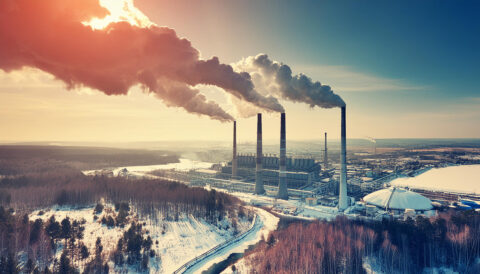Global warming has been making mankind think of the future of human existence. To define global warming it is basically the gradual heating of Earth’s surface, oceans and the atmosphere caused by human activity primarily by burning of fossil fuel that pumps (CO2) Carbon Dioxide, methane, and other gases into the atmosphere due to industrial revolution. It is the average increase of Earth’s temperature. Global Warming is related to Climate Change which in the 20th century is observed mainly due to the activity of mankind. Long term changes in temperatures and weather patterns are observed. Burning of fossil fuel and cutting down forest has caused massive change in the climate for which we are being responsible. The Earth is now 1.1°C warmer than it was in the 18th century. The intense change reflects water scarcity, severe fires, rising sea levels, flood, melting of polar ice, catastrophic storms and decline in biodiversity.
Causes for rising emissions mainly because of Burning coal, oil and gas which produces carbon dioxide and nitrous oxide. Cutting down forests (deforestation). Trees help to regulate the climate by absorbing CO2 from the atmosphere. Increasing livestock farming. Cows and sheep produce large amounts of methane when they digest their food. Fertilizers containing nitrogen produce nitrous oxide emissions. Fluorinated gases are emitted from equipment and products that use these gases. Emissions have a very strong warming effect.
The average global temperature in 2021 was about 1.11 (± 0.13) °C above the pre-industrial (1850-1900) levels. 2021 is the 7th consecutive year (2015-2021) where global temperature has been over 1°C above pre-industrial levels, according to all datasets compiled by WMO (World Meteorological Organization) .
Some long-term effects of climate change observed:
- Predictions by scientists have proved that long-term effects of climate change include decrease in sea ice, an increase in heat waves, and decreased water resources.
- Below are some of the regional impacts of global change forecast:
- North America: Decreasing snowpack in the western mountains; increase in intensity and duration of heat waves.
- Latin America: Gradual replacement of tropical forest by savannah in eastern Amazonia; risk of significant biodiversity loss t; significant changes in water availability.
- Europe: Increased risk of inland flash floods; more frequent coastal flooding and increased erosion from storms and sea level rise; glacial retreat in mountainous areas; reduced snow cover and winter tourism; extensive species losses; reductions of crop productivity in southern Europe.
Africa: Between 75 and 250 million people are projected to be exposed to increased water stress.
Asia: Freshwater availability projected to decrease in Central, South, East and Southeast Asia by the 2050s, coastal areas will be in danger due to increased flooding.
Climate change has a huge impact on the species and also ecosystems. There are major concerns about water availability in some parts whereas there can be flooding in some other parts. Increase in surface temperature of the sea have impacted marine life. The polar region are more affected due to global warming. The temperature in the Arctic is rising and the ice are melting fast. This is a deep concern for the wildlife and the ecosystem.
National Oceanic and Atmospheric Administration have recorded some changes in the Climate Change scenario which have impacted mankind:
- Global temperatures rise in about 1.8°F (1°C) from 1901 to 2020.
- Sea levels have risen from 1.7 mm/year throughout most of the twentieth century to 3.2 mm/year since 1993.
- Glaciers are shrinking in an average thickness of 30 well-studied glaciers has decreased more than 60 feet since 1980.
- The area covered by sea ice in the Arctic at the end of summer has shrunk by about 40% since 1979.
- Rise in carbon dioxide in the atmosphere by 25% since 1958, and by about 40% due to the Industrial Revolution.
- Snow is melting fast compared to long-term averages.
The World Health Organization (WHO) reports that climate change is responsible for at least 150,000 deaths per year, which can double by 2030. The effects of global warming will cause health consequences like Infectious diseases. Heatwaves can cause vulnerable affect on population. Global warming can cause less production of agriculture due to droughts as the rainfall pattern has been disturbed. People are suffering from more respiratory diseases due to pollution and increase in temperature.
Are Humans responsible for Climate Change?
Yes, over 97% of scientists agree that humans are responsible for climate change. Burning of fossil fuels and deforestation have led to fast increases of greenhouse gases in the atmosphere and global warming. For centuries it is known that gases in Earth’s atmosphere like carbon dioxide and methane act as a greenhouse which prevents a certain amount of heat radiation from escaping back to space. The more carbon dioxide in the atmosphere, the warm it becomes. The rise in temperature and carbon dioxide levels we’ve witnessed in the past century are extreme. The rate of carbon emissions are very high causing a warming in our atmosphere.
Reads and Reference :
https://www.un.org/en/climatechange/what-is-climate-change
https://ec.europa.eu/clima/climate-change/causes-climate-change_en
https://www.worldwildlife.org/threats/effects-of-climate-change
https://www.livescience.com/37057-global-warming-effects.html
https://www.nrdc.org/stories/global-warming-101#warming
https://www.usgs.gov/faqs/does-usgs-monitor-global-warming
https://www.unep.org/explore-topics/climate-action/facts-about-climate-emergency
https://www.noaa.gov/education/resource-collections/climate/climate-change-impacts
https://www.unicef.org/environment-and-climate-change
Photo Credit :
https://unsplash.com/photos/landscape-and-aerial-photography-of-icebergs-on-body-of-water-during-daytime-Q1js5z4tKLA?utm_content=creditShareLink&utm_medium=referral&utm_source=unsplash



